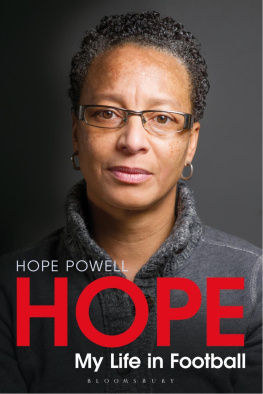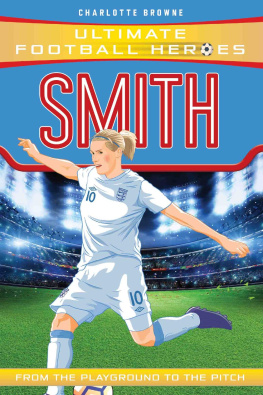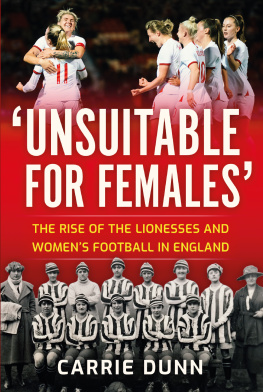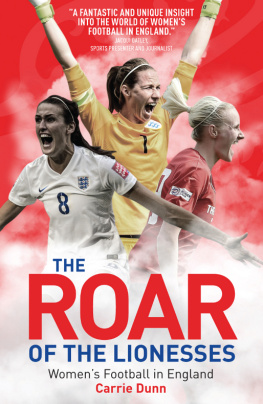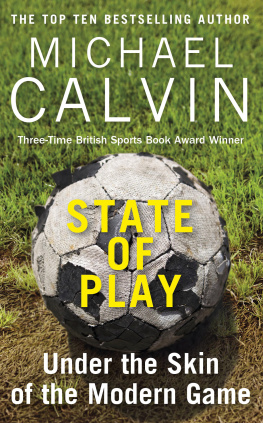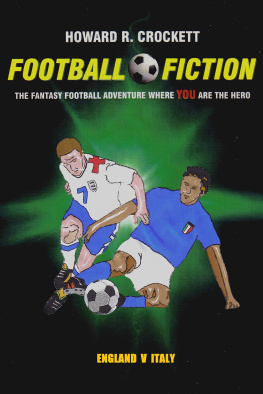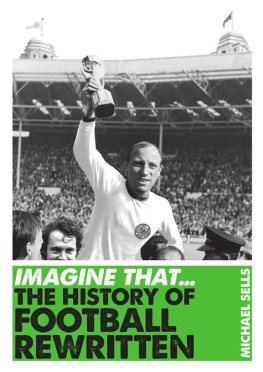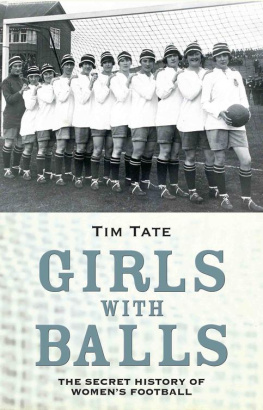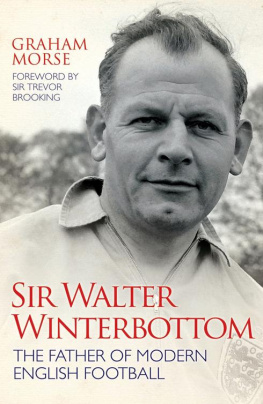

Contents
There are so many people who have been part of my life in football and the journey I have taken. A big thanks all round, and, if for some reason you are omitted from this text of thanks, you know you are a part of my story.
Firstly I must say thanks to the FA, to Howard Wilkinson, Robin Russell and Kelly Simmons for believing I could do the job as England manager.
To my mum, my brother Brian and my sister-in-law Gill, thank you for supporting me regardless and believing in my ambitions.
To Michelle forever the positive who gave me the confidence and made me believe anything I want to achieve is possible. For her unconditional love for all these years.
Brenda and Beth, who have always been there and encouraged me (told me) to start my journey and believing in my ambitions.
To Angie Gallimore you are special!
To the wonderful Marcia Wilson, Mandy Croston and Misia Gerviz for your friendship and support.
To all the staff I worked with over the years who were all part of making the England teams greater, and who all remain my good friends today: Paul Smalley, Steve Rutter, Perry Suckling, Brent Hills, Keith Rees, Mark Phillips, Graham Keeley, Pippa Bennett, Mary Dowd, Charlotte Cowie, Dawn Scott, Naomi Datson, Louise Fawcett, Tracey Kevins, Jill Chapman, Yvonne McLaughlin, Sigrid Baumman, Phil Worrall, Dave Lee (Daisy), Mo Marley, Lois Fidler, Kay Cossington, Ronald Thompson (thanks, Cuz), Colin (Mr) Norman, Margaret McGough, Ros Potts, Donna McIvor, Helen Croft, Lucy Wellings, Kelly Simmons, Helen Nicolaou, Caroline Clay, Graeme Bowerbank, Lucia Sanchez, Katherine Knight, Bev Ward, Morag Taylor, Alex Stone, Glenn Lavery, Scott Field, Stuart Mawhinney, Johan, Andy Carter, Tom Holder, Jag Chagger.
To all the players I worked with over the years it was truly a privilege!
Special thanks to Mr May (Alan), my adopted dad! Thanks for your continued guidance, support, advice and love forever taking the time to listen; always there when needed and undoubtedly always will be.
Dear Rachel Pavlou you are special. My co-pilot and good friend for so many years. Thank you, thank you.
Charlotte. Thank you for believing in this book I look forward to that drink.
And finally, to you, Marvin it has been truly special. Thank you for your patience. And for your hours of time and dedication in pulling this project together. Well done! In you I have also found a friend.
The game of football is quite unsuitable for females and ought not to be encouraged the Football Association, 1921
I was born in 1966, the year England won the World Cup. Its hard to believe, but at the time I came into this world women were banned by the FA from playing football in this country.
For 50 years, the oldest football association in the world did not recognise womens football, did not approve of it and refused to let it happen on any pitch, patch of ground or stadium that had any association with the FA. They gave the red card to any qualified match official officiating womens games. They banned recognised coaches and managers from working with womens teams.
Before I tell you about my life, its really important to understand this because its one of the major reasons why womens football has had to fight so hard for recognition in this country. Most of the world has had a long head start on us, because our national association denied women the right to play the greatest game. I am a genuine student of that game and always want to learn. One of the things that has fascinated me is learning more about the history of womens football in the United Kingdom. This is what I know.
Women were playing organised football in this country well before the outbreak of World War One. But it was during the Great War when womens football really took off. With the men away, women came much more into the workplace. Thousands got jobs in the armaments factories, which were dangerous places to work not just because of accidents and explosions, but due to the chemicals that were used in the making of bombs and bullets. To try to give the women a healthier workplace, they were encouraged to get out during their breaks, exercise and play sport. The game the girls all wanted to play was football.
Armaments factories all had their own teams, and matches began between them to help raise money for war charities. Gradually, the women became more skilled. Professional male footballers invalided out of the war came home to coach and train them. Standards rose, games grew to be ever more competitive, and womens football became a big deal up and down the country. A nationwide tournament, the Munitionettes Cup, was launched. Matches were played at Old Trafford, Ewood Park, Highbury and many other professional club grounds, in front of crowds numbering 20,000 and 30,000. Womens football developed from being a novelty to serious sporting business.
Then the war ended. The men came home and were given their jobs back in the armaments factories. Most of the women lost work and many of the factory teams folded. But the keenest of the women players were determined to play on. New clubs were formed, one of which became legendary the Dick, Kerrs Ladies team. Based in the north-west, the side attracted the countrys best women players. They played, and beat, a French womens national team and, in 1920, played a match at Goodison Park against St Helens in front of 53,000 paying fans.
But a powerful lobby against womens football had begun and the FA listened to it. In 1921, the FA effectively banned women from playing football in this country, a decision that would not be changed for 50 years. Its probably one of this countrys biggest sporting injustices, but sadly unknown by many and largely forgotten.
The FA made much of a book published in 1920 by Dr Arabella Kenealy, entitled Feminism and Sex-Extinction. Dr Kenealy did womankind a huge disservice. Her book gravely warned that over-use, in sports and games, of the muscles of shoulder and chest, occasions atrophy of mammary glands such sterilisation, where it is not actually producing diseased and degenerate offspring, is producing a pitiful race of pallid and enfeebled babies and children.
The FA pounced upon her warning, gave it maximum publicity through the press, and went out of its way to smother womens football in the cot. They even lectured other countries on the ills of the game. When the Dick, Kerrs Ladies went on tour to Canada, the FA wrote to their male Canadian counterparts urging them to ban the team from playing in their country. The Canadian FA agreed and the Dick, Kerrs Ladies were forced to travel south to the USA to rearrange their tour to play against American teams. Even then, the US football authorities would only let them compete against mens teams. Rather interestingly, in their six matches, they won two, drew two and lost two.
For over 50 years, the womens game in England went underground. Matches were played on rugby grounds and in parks, but mostly not in any kind of organised way. There were no leagues, no structures and little administration.
In 1969, the fightback began. The England mens World Cup win in 1966 was a real shot in the arm for English football generally. Everyone wanted to play. The rebel Womens Football Association was formed and, though it was a terminally underfunded and largely voluntary organisation, it sowed the seeds of what was to come. In 1971, thanks to pressure from UEFA, the all-male board at the FA was forced to lift its ban on womens football being played on their affiliated grounds. Not that this meant they would have the remotest interest in becoming involved in supporting the womens game.

